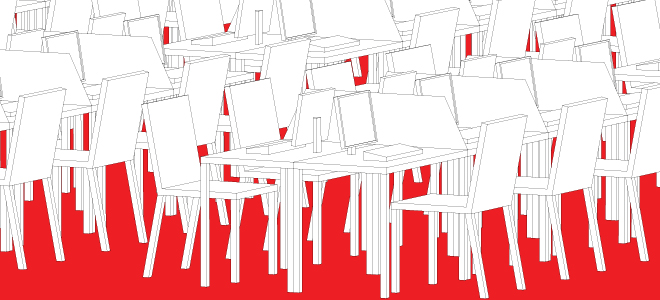The Viewpoint website has been redesigned, thanks to the excellent work of Peter Rood, and the illustrations of Steven Zambrano Cascante. We’re still ironing out some kinks, so bear with us; if you notice any broken links or other problems, please let us know at viewpoint [at] viewpointmag.com.
Our third issue, on the theme “Workers’ Inquiry,” is just around the corner. Until then, here’s a small taste of what’s to come. This issue will present, alongside a wide range of other material, the first English translations of the pathbreaking texts of Romano Alquati. This excerpt, translated by Evan Calder Williams, is from an article first published in 1964 in Classe Operaia.
Romano Alquati, “Struggle at FIAT”
In the framework of the Center-Left, the platform of the “modern contract” once again revealed a boss certain of his ability to quickly retake full political control; it demanded the “collaboration” of workers with a massive and rationalized rise in productivity through a further socialization of work: “automation,” “pluralistic programming,” “State reform”; the working class is recomposed as the Social Brain of capitalist production, imprisoned in an even higher level of dead labor, of machines, which manage the working class with greater rationality yet set themselves against those workers and squash them through the political domination of capital.
If the workers had fought for this contract that contained only the boss’s needs, that same struggle would already be its execution.
But the unions, who have to mediate the project, no longer have a hold on it… So the working class succeeded in catching the project off guard: actually unifying all their struggles through the unexpected insertion of 100,000 FIAT metal workers into the contractual metalworkers’ strike, they exploded with unity in front of the factory gates, in the pickets, and in the piazza battles of all the factories, sectors, and regions against the union-led and democratic plan for the strike. Faced with this worker unity, the weakness of the boss becomes evident. Through a political “autosuggestion” of unified struggle, the working class succeeded in making its leap within the leap of capital. With this strategic victory for the workers, the perspective changed: “fluid passages” now show themselves as “sudden leaps” and as occasions for the working class to politically organize, to reunify itself now outside the political control of the boss.
….
What the workers like about the wildcat is above all its unpredictability: the unpredictability of its generalized rotation in time and in space. The political scope of this form of workers’ struggle can be seen in this: a) it demands an “invisible organization” that does not institutionalize itself as an autonomous organization within the capitalist production process; b) it actualizes itself through a continuous and unpredictable rotation of the tactics, methods, times, and places of the strike; c) it demands nothing.
It’s clear therefore that workers don’t take it as the only form of struggle, but they do see it as the most advanced level of “non-collaboration.”
 Viewpoint Magazine
Viewpoint Magazine